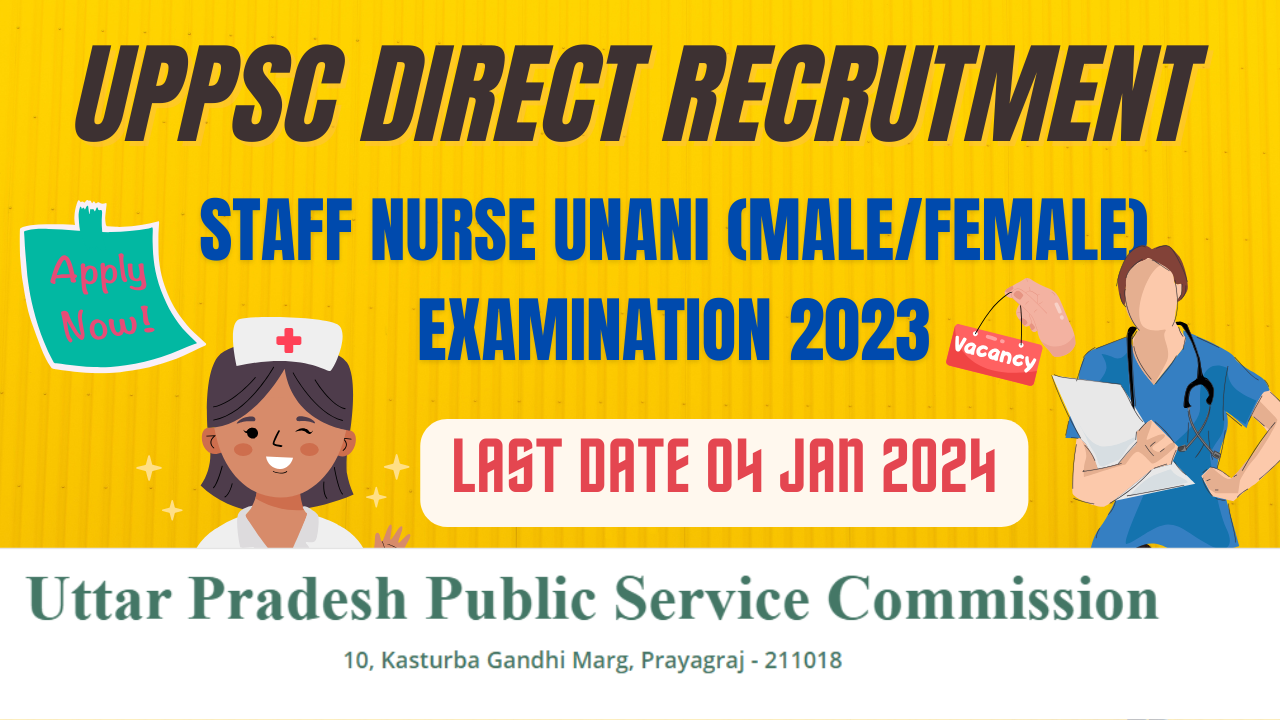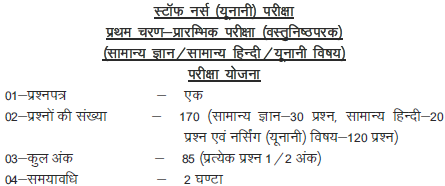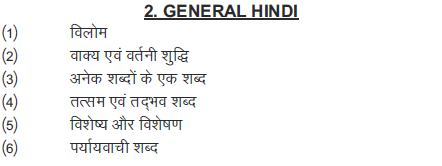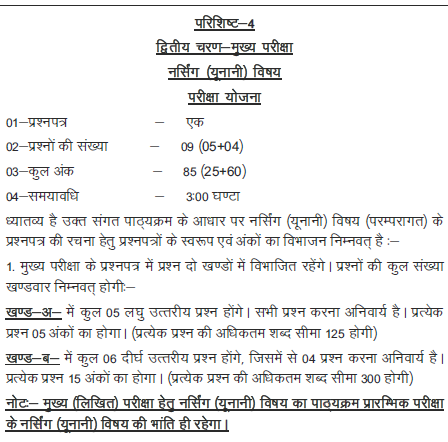JOBS FOR YOU LIVE
An Unique platform for various job opportunities in Central/State/PSUs Organisations

Staff Nurse Unani (Male/Female) Examination 2023
Staff Nurse Unani (Male/Female) Examination 2023
Table of Contents
ToggleONLINE APPLICATION SCHEDULE:
Date of Commencement of On-line Application : 04.12.2023
Last Date for Receipt of Examination Fee on-line in the Bank : 01.01.2024
Last Date for Submission of On-line Application : 04.01.2024
Last Date of Correction / Modification in submitted On-line Application : 11.01.2024
Name of the Post: Staff Nurse Unani (Male):02 Staff Nurse Unani (Female):25
Nature of Post:- Group "B" Non-Gazetted.
Pay Scale- Grade pay ` 4600/- (Pay Scale level-7, pay matrix ` 44900-142400).
MARITAL STATUS:- Male candidates who are married and have more than one wife living and female candidates who have married a person already having a wife shall not be eligible unless the Hon'ble Governor has granted an exemption from this condition.
Academic Qualification : A candidate for direct recruitment to the post of Staff Nurse (Unani) must:- (i) Have passed High School examination with Science and passed Intermediate examination of the Board of High School & Intermediate Education, Uttar Pradesh or an examination recognized by the government as equivalent there to; (ii) Possess diploma in Medical and Surgical Nursing (Unani) registrable with the Ayurvedic and Unani Tibbi Medicine board of Uttar Pradesh. (iii) Possess diploma in Midwifery (Unani) registrable with the Ayurvedic and Unani Tibbi Medicine Board of Uttar Pradesh. (iv) Possess registration certificate as Unani Nurse and Midwife (Dhatri) from the Ayurvedic and Unani Tibbi Medicine Board of Uttar Pradesh.
Preferential Qualification: A candidate who has :- (1) Served in the Territorial Army for a minimum period of two years; or (2) Obtained a "B" certificate of National Cadet Corps, shall, other things being equal, be given preference in the matter of direct recruitment
AGE LIMIT: Candidates must have attained the age of 21 years and must not have crossed the age of 40 years on July 1, 2023 i.e. they must have not been born earlier than 2nd July, 1983 and not later than July 1, 2002, For PH candidates, the maximum age limit is 55 years i.e. they must have not been born before 02 July, 1968. (ii) Relaxation in Upper Age Limit:- (a) Upper age limit shall be greater by five years for candidates belonging to Scheduled castes of U.P., Scheduled Tribes of U.P. Other Backward Classes of U.P., Skilled players of U.P. of Classified Games, U.P. State Govt. Employees including Teachers/Staff of the Basic Shiksha Parishad of U.P. and teachers/staff of the Government Aided Madhyamik Vidyalayas of U.P. i.e they must have not been born before 2nd July, 1978. (b) Upper age limit shall be greater by fifteen years for persons with disabilities (PH) of U.P. (c) Upper age limit shall also be greater by three years + Period of service rendered in Army for the Emergency Commissioned Officers/Short Service Commissioned Officers/ Ex-Army Personnels of U.P.

Syllabus for Preliminary Examination 1. GENERAL KNOWLEDGE (1) History of India and Indian National movement:- In History of India, emphasis should be on broad understanding of social, economic and political aspects of Indian history. In the Indian National movement, the candidates are expected to have synoptic view of the freedom movement, growth of nationalism and attainment of Independence. (2) Indian and World Geography- Physical, Social, Economic Geography of India and the World:- Questions on the Geography of India will relate to Physical, Social & Economic Geography of India. In World Geography only general understanding of the subject will be expected. (3) Indian Polity and Governance, Constitution, Political System, Panchayati Raj & Public Policy, Rights - issues etc:- In Indian polity and Governance questions will test knowledge of country's constitution, political system including Panchayati Raj and Community Development. (4) Indian Economy and Social Development:- The candidates will be tested with respect to problems and relationship between population, Environment, Urbanisations; broad features of economic policy in India and Indian Culture. (5) Current Events of National and International Importance:-This will also include questions on Games & Sports. (6) Indian Agriculture:- The candidates will be expected to have general understanding of agriculture in India, agricultural produce and its marketing. (7) General Science:- Questions on General Science will cover general appreciation and understanding of science including matters of everyday observation and experience, as may be expected of a well educated person, who has not made a special study of any scientific discipline. This will also include questions on role of science and technology in the development of India. (8) Elementary Mathematics up to class 10th level:- Arithmetic, Algebra and Geometry. Note:- The candidates are expected to have general awareness about the above topics with special reference to U.P.

Syllabus of Nursing (Unani) Subject:-
Introduction and fundamentals of Nursing
1. Definition of nursing, special features and historical
aspects.
2. Principles of Nursing managements.
3. Relation of nurse with patients.
4. Duties and responsibilities of nurse.
5. Special training of nurse in respect of recording the vitals
(Pulse, Temperature, Respiratory rate, Blood Pressure etc.
6. Care and maintenance of Wards.
7. Communication skill, data collection, record keeping and
reporting.
8. Sample Collection of specimens of Urine, Stool, Sputum
etc. and precaution being observed for their transportation
to concerned laboratories.
9. Training for bed preparation, bed bath and self bath.
10. General care of patients. including Skin, Hairs, Eyes,
Ear, Nose, Hand, Foots and back etc.
11. Nursing assistance to the patient at the time of
defecation and urination.
12. History taking of Patients, Body examination of the
patient and preparation for various investigations.
Anatomy
1. Introduction of Anatomy.
2. Anatomical position and related terminology.
3. Histology of skin and applied aspects.
4. General anatomy of bones, muscles, joints ad their
applied aspects.
5. General anatomy of body systems and their applied
aspects.
6. General anatomy of Head, Neck, Thorax, abdomen,
Upper limbs, Lower limbs and their surface and applied
anatomy.
7. Descriptive information of vessels, Nerves, ligaments
and membranes
Physiology and Basic concepts of Unani Medicine
1. Definition of physiology and its aims, objectives and
scope.
2. General Physiology of Cell, Tissues, Lymph, and various
body fluids and their transportation.
3. General Physiology of Haemopoetic system and its
applied aspects.
4. General Physiology of Respiratory system.
5. General Physiology of Digestive system.
6. General Physiology of Cardiovascular system.
7. General Physiology of Nervous system.
8. General Physiology of Uro-genital system.
9. Detailed information of Blood pressure. Method of
recording of Blood pressure and precautions.
10. Normal range of deferent Biochemical, Hematological
and Hormonal values in human body.
11. Definition of Ilme tib, aims and objectives.
12. Definition of Umoor-e-Tabiyah, Tabiyat and Quwwat
mudabbir Badan.
13. Descriptive knowledge of Arkaan, Mizaj, Akhlat, Aaza,
Arwah, Afa'al and Qua'a
Preventive and Social Medicine.
1. Definition of Sehat, Marz and Arz.
2. Definition of sabab and its classification.
3. Six essential factors of Life.
4. Effects of Seasonal, Environmental and emotional
factors on health.
5. Detail Knowledge about Neonatal Care.
6. Detail Knowledge about Geriatric Care.
7. Specific knowledge of communicable diseases eg.
pandemin, epidemic, sporadic, xenophilic and
nesocomeal.
8. Specific knowledge of epidemic diseases.
9. Importance of Diet, classification, Ingredients, methods
of preparation of deferent Diets.
10. National schedule of Immunization.
11. General knowledge of Vitamins and Essential Mineral.
12. Preparation of diet as per need of the patients.
13. Effects of Poisoning and their management.
Knowledge of common Poison and their Antidote.
14. Effects of Scorpion bites, Snake bites, Insect bite and
their primary managements.
Ilmul advia and Saidala
1. Definition of Dawa, Ghiza and their classification as
Dawa-e Ghizaee, Ghiza-e dawaee, Jaiyyadul kaimoos,
Radiul kaimoos, Saqeel, Lateef, Ghaleez and Motadi
aghzia.
2. Identification of single crudes drugs and their
temperaments.
3. Descriptive knowledge about prepration of unani
compounds.
4. Aamale saidala as Taqtee, Tahmees, Burada,
Tashwiyah, Taseed, Taqsheer, Khisanda, Joshanda,
Mudabbar, Sofoof, Sahaq. Method of Preparation and
uses. Majoon, Laooq, Jawarish, Itreefal, Khameera,
Roghan, and Tila.
5. Preparation, preservation, uses and doses of Araqiyat,
Sharbatand Kushtajat.
6. Ashkal e advia and its classification.
7. Route of administration of drugs and precautions.
Medicine
1. Effects of disease in humen body. clinical feature and
complication.
2. Concept of Diagnosis.
3. Methods of examination eg.Inspection, Palpation,
Percussion, Auscultation.
4. Examination of pulse and its types.
5. Examination of tongue.
6. Examination of Excreta.
7. Examination of Gait.
8. Examination of sense, Speech etc.
9. Use of Thermometer, Stethoscope and its indications.
10. Definition of Moalij (Hakeem).
11. Different methods of treatment in Unani system of
medicine as Ilaj-bid-dawa, Ilaj-bid-Ghiza, Ilaj-bid-Tadbeer,
Ilaj-bid-Yad.
12. Amraz-e-Riya and their primary managements as
Suaal, Diq, Zeequnnafas, shaheeqa etc.
13. Amraz-e-qalb and their primary managements as
Syncope, Angina, M.I. Palpitation and Hypertension.
14. Amraz-e-Meda and their primary managements as
Ishaal, Haiza, Piles, Yarqaan and Warm e kabid.
15. Diseases of ear, Nose, Throat, Eyes and Teeth sign,
symptoms and their primary managements.
16. Fever, Wajaul mafasil, Niqras, Diabetes Mellitus. AIDS,
Suzaak, Atishak, Symptoms, sign and primary
managements.
17. Descriptive knowlege of Dalk, Ruyazat, Hammam,
Hijamah, Amale Tareeq, Qai, Ishaal, Fasd, Amale kai,
Methods, types and uses.
Specific and Surgical nursing
1. General introduction of surgery.
2. Injections, Sub cutaneous, intra dermal, intramuscular,
injtra-vascular. Methods and preparation.
3. Use of catheter.
4. Procedure related to surgery as sterilization, thermal
sterilization and isolation of patients.
5. Pre surgical preparation of patient.
6. Post surgical follow-up.
7. Preparation of O.T. and its maintenance.
8. Preparation of surgical instruments and their
maintenance.
9. Auto clave, ventilation, light and temperature
management of OT.
10. Role and duty of nurse in OT.
11. General and local anesthesia, Indication and
precautions.
12. Oxygen therapy and Nebulization.
13. Deferent type of Fracture and their management.
14. Surgical diseases and their primary management.
15. Details observation of Patients, record keeping and
reporting.
16. Packing of dead body.
Amraz e Niswan, Qabalat wa naumaulood
1. Definition of Obstetrics and Gynecology.
2. Methods ofP/V, P/S examination.
3. Ante-netal care.
4. Monitoring of foetal movement, foetal parts and foetal
heart sound.
5. Management of labour.
6. Machanism of normal labour
7. Care and maintenance of Labour room.
8. Care and maintenance of neo-natal room
9. Post natal care.
10. Preparation of OT for surgical emergencies during
labour.
11. Care of puerperal period diseases.
12. Methods of abnormal deliveries.
13. Gynecological and obstetrical diseases.
14. Care of Neo born baby, APGAR score medication and
other dietic information. Breast/Top feeding.
15. Identification and uses of instrument are used in
Gynecology and obstetrics.
16. Care of important diseases in neonates as cynosis
score, neo natal jaundice, asphyxia.
